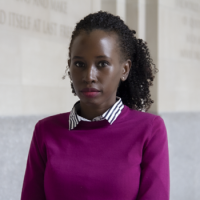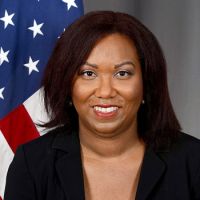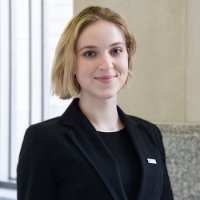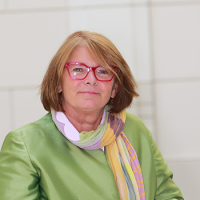Refugee Women’s Inclusion in Peace Agreements and Peacebuilding in Africa: Challenges and Opportunities
Submit a question
Ms. Catharine Helmers, Program Assistant with the Wilson Center Africa Program, welcomed participants and introduced the event, the SVNP project, and the scholarship program. Dr. Chantal de Jonge Oudraat, Wilson Center Fellow and member of the Board of Directors at Women In International Security, framed the discussion, introduced the speakers, and moderated the event. The event featured Ms. Sandra Tumwesigye, a Southern Voices Network for Peacebuilding Scholar and Advocacy and Partnerships Manager at the Women's International Peace Centre (WIPC) in Uganda; Ms. Megan Corrado, Director of Policy and Advocacy at the Alliance for Peacebuilding; and Ms. Vernelle FitzPatrick, Director of the Office of Assistance for Africa in the Bureau of Population, Refugees, and Migration at the U.S. Department of State.
This event examined key barriers to and opportunities for including refugee women in peacebuilding processes, discussed why it matters, highlighted lessons learned from specific case studies, and offered key recommendations and lessons learned for how policymakers and practitioners can effectively include refugee women in peace processes and agreements in Africa.
Dr. de Jonge Oudraat framed the discussion by giving a brief overview of the United Nations Security Council Resolution 1325 that launched the Women, Peace, and Security Agenda. She then highlighted a central element of the Agenda: the recognition of the importance of women’s participation and representation in peace and security decision-making processes. The impacts and experiences of conflict, particularly by refugees, Dr. de Jonge Oudraat emphasized, are different depending on one’s gender. She concluded her opening remarks by setting the stage for the panel discussion around the vulnerabilities and needs of refugee women, the obstacles they face in having their voices heard, and what can be done to ensure that they are included in conflict resolution and peacebuilding processes.
Ms. Corrado began the discussion by highlighting recent successes in refugee women’s inclusion in peace agreements and peacebuilding since the passage of the United Nations Security Council Resolution 1325 in 2000 and subsequent resolutions that have strengthened the document's initial principles. Despite these steps, Ms. Corrado commented that there were still several challenges faced by refugee women regarding their inclusion in peace agreements. She pointed out the difficulty of reaching refugee populations that straddle borders and are scattered across countries. She also noted that the inclusion of refugee women, when it does occur, is often capital- and elite-centric and thus not representative of the diversity of refugee women populations. She expanded on this point by noting how peace processes often center on the perpetrators of conflict while excluding others who are directly impacted, like refugee women, who may have the greatest incentive to participate in peace processes and reach lasting resolutions. Ms. Corrado went on to make several recommendations for improving women and refugee women’s participation in peace processes. She stressed the importance of wide-ranging and inclusive consultation, more funding for peacebuilding (especially given the high levels of funding for security and war), increased investment in Track II diplomacy, the integration of the Women, Peace and Security framework into the larger peacebuilding agenda along with funding to fully operationalize it, and the inclusion of broad cross sections of refugee women in the design, consultation, and monitoring of peace processes. In her final statement, Ms. Corrado advocated for the breaking down of policy silos and increasing the global investment in feminist foreign policy.
Ms. Tumwesigye started by acknowledging that the inclusion of diverse women in peace processes results in more durable peace agreements that are more likely to address the root causes of conflict, have stronger legitimacy and broader ownership, and result in a higher likelihood of long-term success. She then offered her case study research of South Sudanese refugee women in Uganda (Africa’s top refugee-hosting country) as a successful example of such inclusion, giving a few key lessons learned that can be adapted and applied to other contexts. First, she noted that refugee women are often disconnected from peace processes in their countries. To this end, she highlighted the importance of providing communications channels and feedback mechanisms to refugee women within refugee settlements to provide them with information on peace agreement progress and opportunities for participation. Second, she stressed that the inclusion of refugees in peacebuilding processes cannot be gender-blind and that efforts to include refugee women in key discussions should include broad support for and consultation of other refugee women, both in other settlements and those represented by the woman (or women) involved in the discussions. Third, she called for networked advocacy between refugee women and women peacebuilders in the refugees’ countries of origin. Finally, she acknowledged the need for policymakers and practitioners to address practical and conceptual barriers that limit refugee women’s participation, including negative social norms (especially surrounding young women and those with disabilities).
Ms. Tumwesigye then made several recommendations for the inclusion of South Sudanese refugee women in Uganda that are applicable to other contexts as well. She called on parties of the Revitalized Agreement on the Resolution of the Conflict in the Republic of South Sudan (R-ARCSS) to establish and operationalize measures for the sustained inclusion of South Sudanese refugee women living in Uganda in the peace agreement implementation. She then recommended that the Government of Uganda (or host countries in other contexts) and development partners create a feedback loop for distributing information to, consulting with, and soliciting input from refugee women living in settlements. Finally, Ms. Tumwesigye called on supporters of peacebuilding efforts (including U.S. and international governments) to prioritize attention and a funding allotment from the Women, Peace and Security Agenda for specific interventions to facilitate the inclusion of refugee women within settlements.
Ms. FitzPatrick offered a policymaker perspective, emphasizing that the U.S. Government’s work in the humanitarian space through the Bureau of Population, Refugees, and Migration is, itself, peacebuilding work. She focused first on several obstacles that refugee women in Africa face when trying to participate in decision-making processes, both in their home and host countries, which include cultural norms that relegate women to traditional roles and limited access to financial resources. Ms. FitzPatrick observed that women who head households, have disabilities, or have tenuous incomes are particularly vulnerable to physical and sexual violence, thus posing a further barrier to their participation in peace processes. She emphasized that despite these barriers, refugee women are often on the frontlines of peacebuilding, delivering aid, mediating conflict, and supporting their communities—often informally. Ms. FitzPatrick called for the international community to apply a gender lens to foreign policy in order to addressed these challenges and listed some key steps and agreements that have been taken by the United States and other partners to raise the voices of refugee women, including:
- the Women, Peace, and Security Act of 2017;
- the 2019 United States’ Strategy on Women, Peace, and Security (WPS);
- U.S. funding for the United Nations High Commissioner for Refugees (UNHCR) and the Julia Taft Fund;
- the U.S. Government’s “Safe from the Start” program;
- UNHCR’s Global Compact on Refugees; and
- Pledges from the 2021 UNHCR High-Level Officials Meeting.
All of these, she explained, help to address challenges and build self-reliance among refugee women and others impacted by gender-based violence. Ms. FitzPatrick concluded by encouraging peacebuilding actors to engage with refugee women operating on all levels, to focus intentionally on follow-up, and to invest in sustainable capacity building and mentorship to bring refugee women to the negotiating table.
The Southern Voices Network for Peacebuilding: Centering African knowledge and agency is key to building and sustaining peace in Africa. The Southern Voices Network for Peacebuilding (SVNP) is a network of 22 African policy, research, and academic organizations that works with the Wilson Center’s Africa Program to attain the most appropriate, cohesive, and inclusive policy frameworks and approaches for achieving sustainable peace in Africa. Generously funded by Carnegie Corporation of New York since its establishment in 2011, the SVNP works to generate African knowledge to inform U.S. and international peacebuilding policies on Africa; help build the next generation of African peacebuilders through its scholarship program; and create a pan-African network of African peacebuilding organizations, practitioners, and experts to collaborate and share knowledge, best practices, and lessons learned on peacebuilding in Africa.
This event was livetweeted and webcast. Follow the Africa Program Twitter account @AfricaUpClose and catch up on the conversation #WomenBuildingPeace.
Speakers

Advocacy and Partnerships Manager, Women's International Peace Centre

Introduction

Moderator

John O. Rankin Professor of International Affairs and Program Director, M.A. in International Affairs, George Washington University
Hosted By

Africa Program
The Africa Program works to address the most critical issues facing Africa and US-Africa relations, build mutually beneficial US-Africa relations, and enhance knowledge and understanding about Africa in the United States. The Program achieves its mission through in-depth research and analyses, public discussion, working groups, and briefings that bring together policymakers, practitioners, and subject matter experts to analyze and offer practical options for tackling key challenges in Africa and in US-Africa relations. Read more


Environmental Change and Security Program
The Environmental Change and Security Program (ECSP) explores the connections between environmental change, health, and population dynamics and their links to conflict, human insecurity, and foreign policy. Read more
